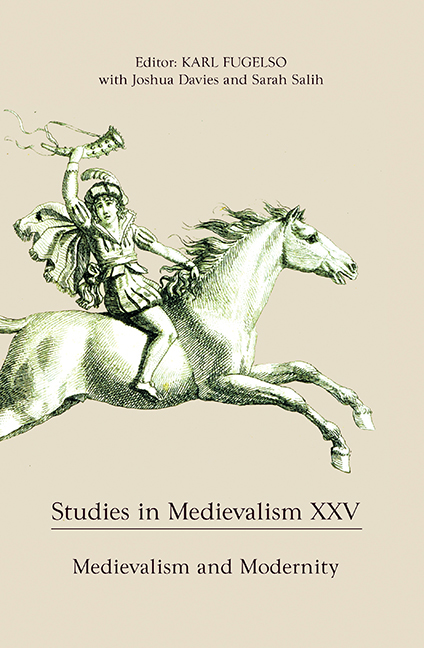Book contents
- Frontmatter
- Studies in Medievalism
- Acknowledgments
- Contents
- List of Illustrations
- Volume XXV 2016
- Editorial Note Karl Fugelso
- I Medievalism and Modernity: Some Perspective(s)
- Medievalism at the End of History: Pessimism and Renewal in Just Visiting
- Medieval Restoration and Modern Creativity
- Crusader Medievalism and Modernity in Britain: The Most Noble Order of Crusaders and the Rupture of the First World War, 1921–49
- From the Republica Christiana to the “Great Revolution”: Middle Ages and Modernity in António Sardinha's Writings (1914–25)
- Moving through Time and Space in Mercedes Rubio's Las siete muchachas del Liceo (1957) via Wagner's Parsifal in Barcelona, Spain (1914)
- II Medievalist Visions
- Contributors
- Miscellaneous Endmatter
Medieval Restoration and Modern Creativity
from I - Medievalism and Modernity: Some Perspective(s)
Published online by Cambridge University Press: 05 July 2016
- Frontmatter
- Studies in Medievalism
- Acknowledgments
- Contents
- List of Illustrations
- Volume XXV 2016
- Editorial Note Karl Fugelso
- I Medievalism and Modernity: Some Perspective(s)
- Medievalism at the End of History: Pessimism and Renewal in Just Visiting
- Medieval Restoration and Modern Creativity
- Crusader Medievalism and Modernity in Britain: The Most Noble Order of Crusaders and the Rupture of the First World War, 1921–49
- From the Republica Christiana to the “Great Revolution”: Middle Ages and Modernity in António Sardinha's Writings (1914–25)
- Moving through Time and Space in Mercedes Rubio's Las siete muchachas del Liceo (1957) via Wagner's Parsifal in Barcelona, Spain (1914)
- II Medievalist Visions
- Contributors
- Miscellaneous Endmatter
Summary
Current trends in medievalism tend to privilege the content of objects of investigation over interest in their form and structure or methods and ideology. The attention given to content, however, reveals only one aspect of medievalism. As originally defined by Leslie J. Workman, and at the foundation of Studies in Medievalism, this field involves “the continuing process of creating the Middle Ages.” In spite of Workman's emphasis on process, sustained attempts by scholars to define the terminology – if not the scope – of medievalism do so with a focus on content. Even the trenchant discussion by Elizabeth Emery, in which she defines medievalism as a method, a way of considering modern culture in light of the medieval, still points back to an analysis of more concrete signs of the Middle Ages, such as characters, themes, architecture, and other predominantly visual markers of the medieval. This essay will investigate a creative practice that pervades contemporary popular music, film, and television through the lens of medievalism and specifically through a consideration of these media in relation to the concept of “restoration.” The application of more abstract paradigms of medieval thought to contemporary modes of art reveals parallels between the Middle Ages and modernity that challenge views regarding the otherness of the medieval as well as modern views of creativity and intellectual property.
Restoration is here understood as the reuse or rewriting of previous sources, or materia, taken in whole or in part by a new composer in a way that both renews and transforms the source. The process of rewriting as a convention of medieval literature has been noted by countless scholars of the Western Middle Ages. One need only consider the expansive rewritings of the Arthurian tradition across the different Western vernaculars to ascertain the ubiquity of this practice. Although medieval writers did not refer to this creative process as restoration, it is outlined in Geoffrey of Vinsauf 's Poetria Nova, a treatise on medieval poetics in which writers are advised to use materia from Latin authorities. I prefer the word “restoration” to other terms to describe this process because it emphasizes similarities among works as it also implies a temporal or historical dimension of making present again past texts and the events they describe, even as they are transformed.
- Type
- Chapter
- Information
- Studies in Medievalism XXVMedievalism and Modernity, pp. 11 - 18Publisher: Boydell & BrewerPrint publication year: 2016



